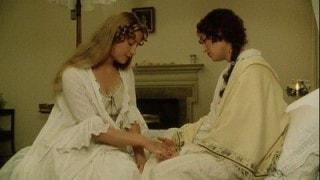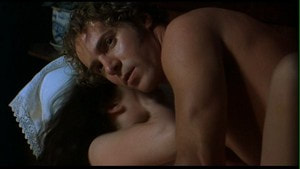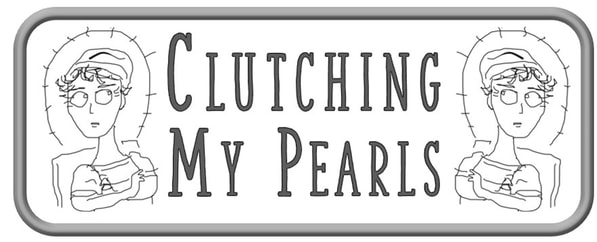| I'm discussing Mansfield Park and its theme of education. Here is a digression on female virtue as it relates to this theme. The fall of Maria Bertram is a central event in the book, and it comes about because of her pride, her passion, and--as Austen tells us--because her moral education had been neglected. "But how little of permanent happiness could belong to a couple who were only brought together because their passions were stronger than their virtue, she could easily conjecture.” -- Elizabeth Bennet, thinking about Lydia and Wickham, in Pride and Prejudice |

I've been reading some recent online discussions about a modern-day Henry Crawford called West Elm Caleb, so this seems like a good time to talk about Austen and sexuality.
Jane Austen’s depictions of human nature are timeless, even if the customs and beliefs of the long 18th century are not.
Since Austen's time, economic and social changes have overthrown the centuries-long enforcement of female chastity before marriage. (And yes, Austen knew there was a double standard in play here, and she mentions this in Mansfield Park.)
Not every modern consumer of Jane Austen novels or adaptations understands just how radically our social mores have changed since her time. For the 1995 BBC Pride and Prejudice mini-series, screenwriter Andrew Davies added additional dialogue not found in the novel, to underscore the crisis brought on when Lydia ran off with Wickham. “Oh, Jane,” Elizabeth exclaims to her sister. “Jane, do you not see that more things have been ruined by this business than Lydia’s reputation?” Later, Jane comes to Elizabeth and confirms, “You meant, I suppose, that you and I… and Mary and Kitty… have been tainted by association; that our chances of making a good marriage have been materially damaged by Lydia’s disgrace.” The sisters are not spelling this out for each other's benefit, but for the viewer's...
 Henry and Maria, 1999 film version
Henry and Maria, 1999 film version Elizabeth and Jane's dilemma is an aspect of the nature-versus-nurture debate as it affected Regency attitudes towards unchaste women. (I am using the value-laden terms of that age while discussing that age.) People in Austen's time debated the influence of nature versus nurture just as we do, though they used different terms.
In prior ages, restraints on female sexual activity protected family fortunes as well as family bloodlines. By "bloodlines," I am referring to the crisis in the Bennet family, the fact that all of the Bennet sisters are "tainted by association" because of Lydia's actions. If Lydia Bennet has loose morals, perhaps all the Bennet sisters do. Perhaps it’s a family predilection. Such a girl wouldn't be welcome as a daughter-in-law. Licentious behavior could be an inherited trait.
This is the question Mr. Collins takes up in his letter to Mr. Bennet after Lydia runs off with Wickham. Was it parental overindulgence that led to Lydia's downfall or was she "naturally bad"?
This is why Austen’s audience wouldn’t have been at all surprised at “the unhappy resemblance between the fate of mother and daughter,” ie., the two Elizas, in Sense and Sensibility. Colonel Brandon’s lost love Eliza commits adultery because of her unhappy marriage. She has a daughter who, in turn, is seduced by Willoughby and is expecting a child. Colonel Brandon laments: "so imperfectly have I discharged my trust!” He blames himself for not being there to safeguard both of the Elizas from falling from virtue.
In Emma, pretty little Harriet Smith can’t expect to marry a member of the upper crust because her own parentage is unknown. As well, since her mother bore an out-of-wedlock child, it’s possible that she inherited her mother’s licentious disposition. The best thing for 17-year-old Harriet, as Mr. Knightley tells Emma, is to get her married young, before she encounters the temptations that seduced her mother: “Let her marry Robert Martin, and she is safe, respectable, and happy for ever." Living out in the country as a farmwife under the same roof as her mother and sisters-in-law will keep her away from temptation and protect her from falling prey to a seducer.
One can scarcely over-exaggerate the emphasis given to the importance of female chastity in English literature. You can align yourself with those values, or you can rail against the hypocrisy and the double standard, as you please, but being culturally literate means having a grounding in the customs and beliefs of the past.
Our new prosperity and our new attitudes are overthrowing cultural mores that have persisted for thousands of years, mores that were enforced by men and by women. We've now arrived at a culture where some young women think they need to defend their lack of interest in casual sex--to protest that they are not prudes. There is a newly-minted term for their preference: "demisexual," which means "lack of sexual attraction to others without a strong emotional connection."
Did we need a new word for this? It's like the advertisement I just saw for "re-usable tissues," an environmentally-conscious alternative to disposable tissues. Um, we used to call them "handerkchiefs."
I understand that "demisexual" gives a medical/scientific gloss to human behaviour and it is a value-free term. Other terms describing sexual activity are value-laden: chaste, virtuous, maidenly, frigid, prude -- slut, skank, licentious, wanton, promiscuous. But it's still seems bizarre to me to discuss sexual behavior without reference to our past, our culture, or our evolutionary imperatives.
The online articles I've seen on demisexuality do not even mention the historical context of opinions around casual sex. "Unfortunately, there’s not a whole lot of information available about what it's like being demisexual," says Web MD, as though being indiscriminate in your choice of sexual partners has always been the default position for females. In fact, for most of human history, including prehistory, obtaining a committed long-term partner was essential for a woman's very survival and that of her children.
But if this is not apparent to a new generation trying to decide if they are allosexual, graysexual, demisexual, or whatever, maybe it would be helpful to spell out some historical and religious context.
 Obama might have promised cradle-to-grave security for women, but 18th century politicians didn't
Obama might have promised cradle-to-grave security for women, but 18th century politicians didn't Some modern readers are inclined to defend the rebellious Lydia or the charming, cynical Mary Crawford, who calls her brother's affair with a married woman an act of "folly." (In contrast, the heroine we love to love, Elizabeth Bennet, calls Lydia and Wickham's behaviour "infamy.") Today, we are more apt to condemn the historical restrictions on female sexual activity as patriarchal and repressive.
But before blaming everything on the patriarchy, I think we should at least take into consideration that we live in a much more prosperous age, incredibly more prosperous, in fact. Human behaviour is influenced not only by social and cultural factors, but by economic ones as well. Today, single mothers are not sent off to the workhouse or left to beg at the side of the road. Today, a range of social programs make it possible to rear children without a bread-winning father in the house. As well, we have birth control and can dismiss traditional strictures against casual sex as "slut shaming."
In Austen's day, there was no comparable social safety net and no reliable birth control. In Austen's day, sexual activity outside of a committed relationship meant the very real risk of contracting venereal disease, which was difficult and dangerous to cure. It meant social ostracism and for all but a privileged few, utter privation.
I'm not trying to push back against today's social programs, I'm just pointing out that if we judge Regency attitudes in the light of our post-Christian modern attitudes, the conversation isn't very meaningful if we completely untether that discussion from the history of economic and technological change.

Although we live in a post-Christian society, our cultural institutions are based on Christianity and so is our literature. To be educated means having a grounding in that culture. I'm not saying you need to be Christian. Not at all. I am saying that understanding the literature of the past means having some cultural literacy. For example, a culturally literate person understands what the picture at the right refers to.
I'm also not saying that everybody in the past abstained from extra-marital sex. Just because monogamy was the cultural ideal, that doesn't mean that everyone lived up to that ideal. Of course there were hypocrites, and shotgun weddings, and prostitutes, and discreet hospitals for unwed mothers.
Austen disapproved of the rich and titled class who could have affairs and have illegitimate children without facing the economic or social consequences that the lower classes faced. As an example, here's a post by Austenesque author Regina Jaffers concerning a Regency scandal in high life involving double adultery. Austen herself commented on this scandal: "What can be expected from a Paget, born and brought up in the centre of conjugal infidelity and divorces? I will not be interested about Lady Caroline. I abhor all the race of Pagets." She also held the Prince of Wales in utter contempt.
Maria Bertram of Mansfield Park is not a poor peasant girl. She does not face starvation for leaving her marriage, but her father refuses to shelter her under his roof, as she is a bad example and an "insult to the neighbourhood." Taking her back would be giving his "sanction to vice."
Maria's actions put her outside of respectable society, they affect her economically, and finally--and to Austen, most importantly--there are the religious sanctions. Austen is unequivocal that Maria's adulterous affair is not only socially indefensible; it is a sinful act, a "sin of the first magnitude."
It's not for me to defend or critique religious belief, but just for the record, Austen was a sincere and, I think, an orthodox Anglican. This means she believed that sinful behaviour led to consequences on earth and (in the absence of repentance) in the hereafter.
More than 60 years ago, the great Christian apologist CS Lewis understood that the idea of fornication-as-vice was becoming alien to the modern mind: “As long as this sin might socially ruin a girl by making her the mother of a bastard, most men recognized the sin against charity which it involved, and their consciences were often troubled by it. Now that it need have no such consequences, it is not, I think, generally felt to be a sin at all.”
Uncharitable indeed. In 1813, a girl named Fanny Amlett was executed by public hanging for drowning her newborn child. She had been seduced and abandoned by a naval officer.
Today, we're a long way from the world of Mansfield Park. We're a long way from Edmund's horrified reaction to Mary Crawford's cool discussion of adultery: "So voluntarily, so freely, so coolly to canvass it! No reluctance, no horror, no feminine, shall I say, no modest loathings? This is what the world does. For where, Fanny, shall we find a woman whom nature had so richly endowed? Spoilt, spoilt!... oh, Fanny! it was the detection, not the offence, which she reprobated."
Edmund believes that it would only be natural for females to recoil with loathing from the idea of casual sex and infidelity. Not only were Christian women trained to think this way (nurture), these feelings were inherent to their very nature, and Mary's faulty upbringing has spoiled--ruined, destroyed--her character and possibly her soul.
Jane Austen makes it very clear that Maria Bertram Rushworth's personality (her nature) had a lot to do with her fall from grace. "The high spirit and strong passions of Mrs. Rushworth, especially, were made known to [her father Sir Thomas] only in their sad result." I started this post by saying that Austen's depictions of human nature are timeless. The fact that the behaviour of the man known as West Elm Caleb has stirred up so much indignation is an indication to me that human nature hasn't changed that much. "If your Miss Bertrams do not want to get their hearts broke," Mary Crawford might say today, "let them avoid West Elm Caleb."
Maria Bertram's personality plus her faulty upbringing led to her downfall, and this is the moral lesson of Mansfield Park. I will resume the theme of education in Mansfield Park in the next post.
| In an earlier post, I wrote about melodramatic novels in which the threat to female virtue is "The Fate Worse Than Death." Colonel Brandon explicitly tells Elinor that the sorrow he experienced when Eliza was married to his brother was nothing compared to how he felt when he heard of her divorce, ie, when he learned that she had committed adultery. It was her fall from virtue which threw him into permanent gloom, not their foiled elopement. "The shock which her marriage had given me,” he continued, in a voice of great agitation, “was of trifling weight—was nothing to what I felt when I heard, about two years afterwards, of her divorce. It was that which threw this gloom,—even now the recollection of what I suffered—” An article on this same topic, built around Goldsmith's phrase, "When lovely woman stoops to folly" "Christianity is the assumption that underlies the entire novel," says Karen Swallow Prior of Pride and Prejudice in her new podcast, 'Jane and Jesus.' |

 RSS Feed
RSS Feed